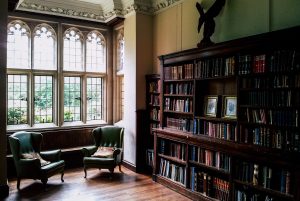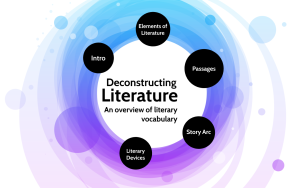2 Literary Vocabulary
Learning Objectives
-
Practice standard literary vocabulary terminology to gain confidence in talking about narratives.
-
Appropriately paraphrase and summarize texts.
Chapter & Discussion
This chapter includes a presentation that can be navigated in a classroom setting or independently. You can access the presentation via the link below.
Deconstructing Literature: An Overview of Literary Vocabulary
Work through the different sections of the chapter and discuss ideas and topics as they arise. If you’re working independently, take notes instead. Notes and active discussion will be helpful in navigating this week’s assignments.
What is Literature?
In an academic setting, the word literature is used to refer to any type of story. We also use the word narrative to note anything with story elements in it.
Reading stories is different from reading for information, so we split these into separate categories.
Storytelling is an artistic expression. We can think critically and discuss all kinds of interesting phenomena.
The goal of today’s discussion is to build on your literary vocabulary by discussing common terms that scholars use when discussing literature. These terms form a framework for literary discussion and these concepts will help us better understand the art of storytelling.

Elements of Literature
These are the biggest working pieces of storytelling. They are seen as the most important concepts in literature. They are:
Theme– The message, moral, perspective, or worldview that the story was written to communicate. The “thing that the author has to say.”
Setting– The time, place, and special circumstances in which the action takes place.
Characters– The people* that are involved in the action.
Plot– What happens; which is ultimately the consequences of the characters’ choices.
Passages
Passages are the actual writing in a narrative. They usually look like paragraphs.
Descriptive Passages tell us about the setting or circumstances. Their job is to illustrate the scene.
Action Passages tell us what’s happening in the narrative.
Dialogue Passages tell us what the characters are saying (or thinking).
Story Arc
The Story Arc is a way of envisioning where we are in the story. It’s usually a measure of tension over time.
Exposition is when the author gives us background information.
Rising Action is when tension builds in the story as a result of conflict.
Climax refers to the height of the action. The big choice that determines the outcome.
Resolution is when the author tells us the details of how things end up.

Literary Devices
Authors use literary devices to share their voice in writing. They usually help an author to sound unique and to communicate ideas. Examples include:
Metaphor– A poetic comparison to two things. The qualities of one are usually carried over to the other.
Foreshadowing– when an author hints at things to come later in the story
Imagery– Where an author uses vivid description to help you picture an idea or scene
And there are many more literary devices.
Assigned Reading
Here are this week’s readings. Additionally, please read for your own personal enjoyment for 1/2 hour each day. This will be called your “Reading Zone” reading and it will coincide with many upcoming activities.
How to Write Descriptively by Nalo Hopkinson (via TEDEd)
How to Discuss Literature by Kevan Bennett et al (via Palm Beach State College)
Practice Set: Literary Vocabulary
Click here to complete a practice set that explores concepts from the chapter.
These practice sets are designed to resemble the types of questions you’ll encounter on the GED RLA test. In this case, I am including a full novel chapter so that the reading can be engaging and so that you can have meaningful practice in the skill of close reading.
All of the practice sets in the Literature Unit will take on this format so that you can engage in enough practice to level up your reading skills while having access to literature that’s worth your time.
Assignment: Literary Vocabulary Self-Test
This is a self-test to see what you remember about the vocabulary for this unit. Here are the instructions:
-
For each of the following, write a definition from memory. If you don’t know an answer, make a guess.
-
Then, check your answers against this week’s ELA lecture notes. If you got it right, make the text bold.
Theme
Setting
Character
Plot
Action Passage
Dialogue Passage
Descriptive Passage
Exposition
Rising Action
Climax
Resolution
Metaphor
Foreshadowing
Imagery
Assignment: Reading Zone Response (250 Words)
For Reading Zone, you must find a novel that is interesting to you and enjoyable to read. If you need help finding a Reading Zone book, please ask. Please read your Reading Zone book for a half-hour each day. On class days, there will be time in class dedicated to reading.
Create a response to this week’s reading that addresses the following prompts:
-
In one paragraph, summarize what you’ve read this week
-
In a second paragraph, pick four of this week’s literary vocabulary words (you can find these in the self-test) and describe how these concepts appear in your book.


